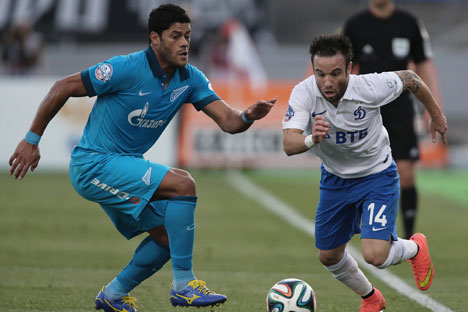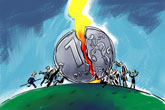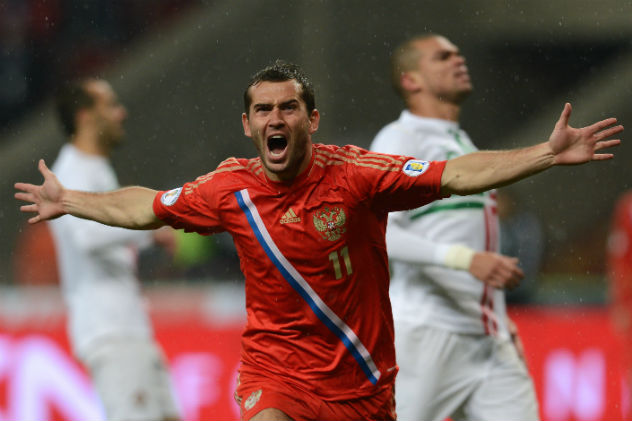The fall of the ruble threatens Russian football

Many foreign footballers have contracts in foreign currencies, but receive their salaries in rubles. Source: RIA Novosti / Igor Russak
According to a recent study carried out by the Sports.ru website, the 10 highest-paid soccer players in the Russian Premier League earn a total of 47.5 million euros ($60 million) a year. Some straightforward calculations can demonstrate that when, back in the spring and summer, the euro cost 38 rubles, that figure in the national currency amounted to 1.805 billion rubles. Today, when one euro costs 73 rubles, that figure equals 3.45 billion rubles. Therefore in a short period of time the amount needed to satisfy those contractual obligations and pay a small number of players has risen by 1.7 billion rubles.
Such financial fluctuations could not but have reflected on the budgets of even the most commercially successful Russian clubs. Leonid Fedun, the president of Spartak Moscow FC, said that his club's expenses have increased by 50 percent, but the revenues have remained the same. “The stadium used to cover 20 percent of our expenses, now only 10 percent,” he said in an interview with Sport Express, adding that, according to his calculations, five other teams are also facing very serious difficulties.
“Many foreign footballers have contracts in foreign currencies, but receive their salaries in rubles according to the exchange rate set by the Central Bank,” explains sports lawyer Yury Zaitsev. “Some Russian players are also paid in that manner.”
Zaitsev also points out that this system has several particular nuances.
“The payments are not always made on time. For example, the player will receive August's salary in October, not September. Respectively, the amount will be calculated according to the August exchange rate and will be smaller than the player expects.”
Not only money
It is obvious that the top clubs, among which are Zenit St. Petersburg, Dinamo Moscow, CSKA Moscow, Lokomotiv Moscow and Spartak, will have it easier surviving the current hardships. The main problem is that it is not clear how the financial fluctuations will end - whether the currency will return to the usual valuations or whether Russia will have to live “as it is now.”
Agent Arsen Minasov, who represents Roman Shirokov, captain of Russia's national team, told RIR that on the one hand Russian soccer will certainly suffer, but on the other, today too much emphasis is placed on the material side of football. “It is possible that some clubs could go bankrupt and even close,” says Minasov. “Workers will suffer, as well as the administrators, the doctors, the footballers and of course the coaches.”
It should be noted that many problems concerning Russian soccer have profound roots and the currency fluctuations have only exposed them. It is difficult to argue with the fact that before the latest financial woes the country had resources for the development of the game, but they were not always used efficiently. “It will be interesting to see how the top clubs change their policies in relation to the economic difficulties,” says Minasov.
Competitive conditions
It was clear that stipulating the contracts with Premier League players in euros helped Russian teams to be competitive on the international market. However, future agreements will be signed taking into consideration all possible realities. “Today more and more often clubs want to fix the exchange rate, but not everyone agrees,” says Zaitsev. “Foreigners spend the money in foreign currencies and in the event of a fixed rate, they would receive less than they expect.”
It is also important to keep in mind that the Russian football market was clearly overheated. Foreign players, who were not even of the best quality, received salaries that were exceptionally high even for world standards. In sum, playing in Russia will not be as lucrative as before, but the salary levels will still help Russian Premier League clubs beat the financial competition from countries such as Portugal or Brazil.
Spartak president Leonid Fedun made another interesting statement, this time concerning the club’s new contract with striker Artyom Dzyuba. Despite the Russian being offered a contract with the highest salary in the club, the agreement is not in rubles because “no one wants to receive rubles.” The situation implies that besides the clashes on the pitch, in the near future Russian soccer will see the most interesting transfer period in its history.
All rights reserved by Rossiyskaya Gazeta.
Subscribe
to our newsletter!
Get the week's best stories straight to your inbox

